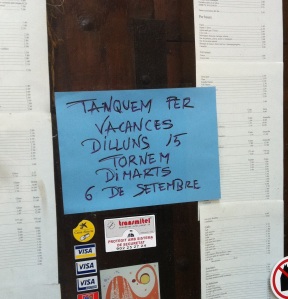Note: This was originally the last part of the post: Working in Spain but has been expanded and thus warranted (in my opinion) its own, albeit short-ish, post.
You know that moving here requires a change in your cultural expectations, some of which you will be prepared for and some of which will leave you shaking your head in disbelief and muttering to yourself “how can people live like this?” (Cases in point: The infuriating bureaucracy, the acceptable levels of inefficiency of most blue collar workers, and my personal pet peeve, Spanish TV).
One that you had better not let catch you off guard is the average salary for a white collar, knowledge worker position. Salaries for these types of skilled jobs are much lower in Spain than in the US and Northern European countries. This did not use to be a big issue here, as the costs of living were also relatively low. However, since joining the EU salaries in Spain have stagnated while housing, food, utilities and just about everything else have increased in price significantly.
How much lower I hear you ask? I am just going to tell it to you straight: Be prepared to take a 30-70 percent pay cut from your US salary. My last US salary was $75,000 a year plus benefits, 401K, three weeks vacation, etc. My last salary in Spain was EU27,000 (which converted to between $32,000 and $39,000 over the course of the year I worked there), and was considered a good salary–OK, I did get about 8 weeks of paid vacation and 5 hour workdays through the month of August, (but I also paid about 21% into the social security/public healthcare system–which I did not and do not use personally). But seriously – 32K??? That is a big step down my friends.
Now, this might seem like an immediate deal killer when deciding to live here, but what you won’t realize until you get here is that life is much simpler. It took me a while to figure this out, but now when I visit my friends (who are essentially living exactly as I was before I moved here), the conspicuous consumption of the most inane shit is SO obvious to me, whereas while living there it was an invisible norm. For example, a friend of mine makes $115,000 a year. She is single, has no children, has paid off her student loans, and rents a two bedroom condo in downtown San Diego. The last time I visited her, she made a comment about needing to make more money, to which I responded “but what exactly are you spending 115k a year on now?” Mind you, she has no hobbies, and yet her answer was not shocking: Two gym memberships (one near her work and one near home). Manicures and pedicures every two weeks. Haircut and color every month. Car payment. About $100 on drinks and taxis home every week. A house cleaner every two weeks. Eating out 3x a week. Cable and Tivo. Multiple magazine subscriptions. Lunch in the office cafeteria every day. Fancy coffee 2x a day. New shoes or item of clothing at least once a week.
All of this is pretty standard for the average single, childless California resident. I had most of this and more, because I had a yard and pets and hobbies and sports and everything needed taking care of and maintenance. And yet none of it was essential, although it certainly feels like it is when you live there.
But I don’t have any of those things now, and I find myself going out at night far more frequently than when I am in California, getting outside for a few hours or more every single day, spending far more time with friends, going to the beach more often, participating in more activities and sports, exploring more cultural sights, museums and exhibitions, relaxing a lot more–and not even feeling guilty about it–just being more social in general, because that is what you do here, that is how the cities and neighborhoods are arranged.
I cannot seem to replicate this whenever I am in the US just visiting. It is too spread out, people and things are more isolated from each other, even down to how people work- in the US was have cubicles and walls and offices. Here, you sit next to your coworkers at a long table, or facing each other at a desk. You can always see other faces around you.
And this is about as best as I can define it now. I miss the great US salaries. But giving them up, (temporarily, I hope) has shown me a way of life that, if not everyone’s cup of tea, at least has made this expat a lot happier.













